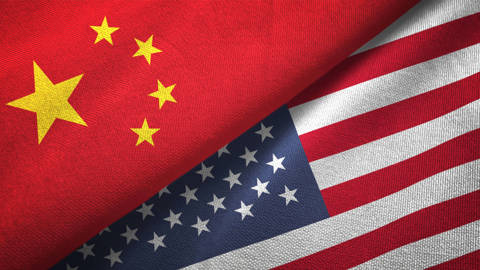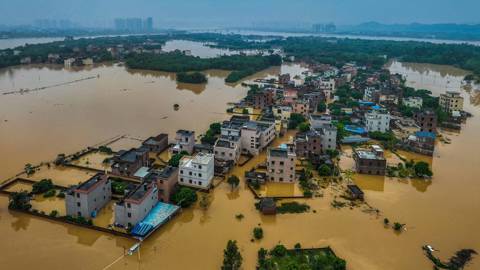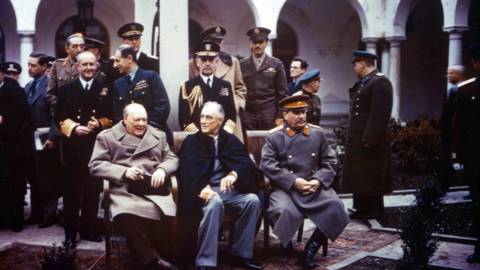Is the US Ready for War?
Since the end of the Cold War, the United States has been the world’s only superpower – a status ensured by the country’s powerful military. But great-power competition is making a comeback, raising questions about US preparedness.
Listen and subscribe to all episodes from your favorite podcast app. Find Opinion Has It on Apple Podcasts, Google Podcasts, Acast, or via RSS Feed. Have a suggestion for an episode? Email us at podcasts@project-syndicate.org.
Transcript
Elmira Bayrasli: Welcome to Opinion Has It. I’m Elmira Bayrasli.
Is the US military losing its competitive edge? When the Soviet Union collapsed in 1991, the United States became the world’s only superpower.
Archive Recording: Good evening. I’m Gene Randall in Washington. We are standing by for an Oval Office address by President Bush, as he contributes to a day even historians may have trouble describing.
Archive Recording, President George H.W. Bush: This is a victory for democracy and freedom. It’s a victory for the moral force of our values. Every American can take pride in this victory.
EB: With the world’s strongest military and largest economy, the US seemed to be untouchable. It became the leader and defender of global institutions and the world’s policeman.
Archive Recording, President Barack Obama: In an uncertain world full of breathtaking change, the one constant is American leadership.
EB: But great-power competition is making a comeback.
Archive Recording: It’s definitely a new chapter in superpower relations.
Archive Recording: China’s newfound strength is everywhere.
Archive Recording: Are China and the United States headed for a new cold war?
EB: Is the US military ready for this new reality? Not according to today’s guest, Michèle Flournoy.
Hello, Michèle.
Michèle Flournoy: Hey, how are you?
EB: Good. I’m Elmira.
Michèle is Co-Founder and Managing Partner of WestExec Advisors, and a co-founder and former CEO of the Center for a New American Security. From 2009 until 2012, she served as US under-secretary of defense for policy. She joins us from Washington, DC
Michelle, I want to start by looking at how the global conflict landscape is changing and what that means for US foreign and defense policy. And if we look going way back to 1991, after the fall of the Soviet Union, there wasn’t really a single military power that could really stand up to the United States. The end of the Cold War meant US foreign policy no longer had a single focal point. How did this change the US military’s mindset and priorities?
MF: After the fall of the Soviet Union and the collapse of the Warsaw Pact, there really was the sense of the US being a sort of singular power. And as we started to look around, the challenges that the Pentagon was faced with at the time were from weak and failing states and from the wars that those were creating. So, think about it. It was Somalia, then it was Haiti, then it was Bosnia, then it was Kosovo. So, that became more of the focus of the military and trying to shape the international environment to contain or reduce the instability that was coming out of these weak and failing states. That was sort of the focus for that decade up until 9/11.
EB: After the terrorist attacks of September 11, 2001, the US got a new focal point: terrorism. But it was far from narrow in scope. First, the US invaded Afghanistan and Iraq.
Archive Recording, President George W. Bush: Our war on terror begins with al-Qaeda, but it does not end there.
EB: The US also attempted to root out terrorism far beyond the Middle East.
Archive Recording: Now to the US drone strike taking out militants from the terror group al-Shabaab in Somalia.
Archive Recording: This is the first time the US has targeted ISIL in the Horn of Africa.
Archive Recording: The Pentagon estimating eight militants killed.
EB: Ultimately, the US military spent two decades fighting terrorism all over the world. That didn’t leave much capacity to prepare for the future.
MF: So, after 9/11, the acute focus on global counterterrorism and then the wars in Afghanistan and Iraq really meant that the focus in the Pentagon was in fighting the wars we were in. So, emphasis was on immediate near-term readiness, emphasis on getting the equipment that forces in the fight needed in the moment. So, you had the MRAP program, which was to try to deliver heavier, more armored, more protected vehicles when we started experiencing IEDs, improvised explosive devices, on the battlefield that were killing lots of American troops. You had an emphasis on getting more drones into the battlespace to increase our ability to do intelligence surveillance and reconnaissance. You had all kinds of emphasis on the immediate needs of the force for right this minute. And that’s appropriate when you have thousands and thousands of Americans in harm’s way. It would be unforgivable not to have that focus on getting them what they need to prosecute their mission and do it with minimal risk and harm. But what it does is it gives you almost no more bandwidth and far fewer resources for investing in the future.
EB: And meanwhile, the conflict landscape is changing again. And this time, we can really say it’s the return of great-power competition and that main competitor to America’s global hegemony is China. How has China expanded its military capabilities in recent years?
MF: So, China really went to school on the United States military’s performance in the first Gulf War, which combined stealth long-range precision strike, and this approach where we would come in, we would establish superiority in the air, at sea, under sea, on land, and then that superiority would give us lots of freedom of action to prosecute a military campaign with, frankly, very little that the adversary could do about it. So, China sort of said, “Hmm, if that’s what I’d be up against, how do I stop the power projection and deny them superiority in every domain?” If you read Chinese military doctrine, the first thing it emphasizes is cyberattacks on critical infrastructure in the United States to try to take down the electricity grids around US spaces and prevent the forces from even leaving the United States in the first place. It talks about early attacks on assets in space to prevent our ability to navigate, to target, to communicate, to do command and control effectively.
Then, if you actually get to the region, you will encounter huge batteries of thousands and thousands of missiles of various ranges that can strike our bases in the region, can strike our ships at sea, our aircraft in the air. And then they add to that things like electronic warfare, which would jam our systems, cyber warfare against the tactical force, and so on and so forth. So, it’s this very layered set of measures that are designed to prevent us from ever actually reaching them and engaging in some kind of operations to stop their aggression.
EB: So, while the US has been consumed by counterterrorism, China has been preparing for the future of war. Crucially, that includes cyber warfare, an area where both China and Russia have managed to hit the US.
Archive Recording: We are learning more about a massive hack attack on Microsoft’s widely used email software. Some 30,000 US companies could have been hit in this attack.
Archive Recording: The tech giant says that the group has been trying to steal information from a number of American targets, including universities, defense contractors, law firms, and infectious disease researchers.
Archive Recording: All of this makes this potentially worse than that SolarWinds hack back in December, which has been attributed to the Russians.
EB: So far, cyberattacks haven’t brought about large-scale destruction. Nobody has hacked weapons systems or crippled critical infrastructure, but that doesn’t mean the attacks haven’t done serious damage.
I want to pick up on cyber warfare. It’s an area where the US has traditionally been seen as somewhat weak. You’ve actually argued that this is partly because the Defense Department is fixated on the threat of a “cyber-Pearl Harbor.” But states like China and Russia are mounting cyberattacks with very, very different goals, like particularly undermining the credibility of US institutions. What needs to change about the US approach to cyberspace?
MF: I don’t think the cyber-Pearl Harbor is necessarily the most useful scenario, because I think we put things in very neat stovepipes, like attacking the military or attacking civilian targets or attacking critical infrastructure. And the truth is, the Chinese don’t see it that way. They will almost certainly attack civilian-operated critical infrastructure, like power grids, in order to achieve a military objective, which has stopped US forces from being able to leave their home bases. So, we have to think across the lines of the various internal divisions we have with regard to [the Department of Defense’s] mission in cyberspace, [the Department of Homeland Security’s] mission in cyberspace, [the National Security Agency] and the intelligence community’s mission in cyberspace. What are private companies responsible for? And we have to pull together a much more holistic picture, because China won’t respect those boundaries if they actually ever use cyberattacks for more than espionage. And the ability to work across those boundaries, to share information, to coordinate our situational awareness, to coordinate our responses, to coordinate our defenses ,and so forth, will be absolutely critical. So, that’s really what I mean. We have elements of strength in our cyber defenses and people, many people, argue rightly that we are probably the most powerful cyber power in the world, but our vulnerability is these stovepipes. And the fact is that the Chinese, the Russians see it all as one big attack surface, and they will cross it at will, which makes it very hard for us to coordinate a kind of unity of effort in both defending against it, deterring it, and then, if necessary, responding to it.
EB: America’s vulnerability to cyberattacks has reinforced the perception that the country is in decline. And it’s hardly the only thing denting America’s international image.
Archive Recording: It is hard to put into words what exactly we witnessed today, because we’ve not seen this before.
Archive Recording: Supporters of Donald Trump stormed the US Capitol as the Electoral College votes from the presidential election, which Joe Biden won, were being tabulated and confirmed.
Archive Recording: Protestors have been gathering in Washington, DC, and many other cities to mobilize against racism and police brutality.
Archive Recording: The nation tonight has marked a new watershed moment in the COVID-19 pandemic: 500,000 confirmed deaths.
EB: Meanwhile, China has adopted an increasingly muscular foreign policy, especially in Asia.
Archive Recording: Beijing is stepping up its presence in the South China Sea. The Chinese government has maneuvered hundreds of militia ships into the disputed waters.
EB: So far, the US has been reluctant to push back. Michèle warns that all of this could embolden China and end up triggering a conventional war.
MF: In the South China Sea, the Chinese are constantly pushing the boundaries of what the international community will accept. So, they’re always trying to create new facts on the ground. Whether it’s staking claims to disputed fishing areas or staking claims to disputed territories or creating new islands out of a bunch of rocks with landfill, they’re steadily pushing the envelope. What matters to them is: what is the response? And I don’t think either side has any interest in going to war with one another tomorrow, but I think there is a substantial risk of miscalculation, because we don’t understand each other as well as we need to.
Right now, if you turn on the television to nightly news in Beijing, you’re going to see story after story about the US in disarray, the US in decline, the US is down and out, and it’s never getting up again. Now is our moment; we can take their place as the dominant power in the region and, eventually, economically in the world. And if you really believe that, as China’s leaders, you can talk yourself into a posture of greater risk-taking that could lead to some real miscalculation, because I don’t see any scenario where the US starts something as the aggressor. It’s only if China miscalculates and either starts aggression, or we have some kind of incident at sea because some cowboy is flying a [People’s Liberation Army] aircraft too close to one of our aircraft, or some cowboy on the Chinese navy is turning right in front of one of our ships that’s at full steam ahead and risking an accident to do some chest-thumping, military chest-thumping.
So, that’s what I worry about. And we do not, ironically, sadly, we do not have the kind of rules and agreements in place that we had even with the Soviet Union at the height of the Cold War. We had an Incidents at Sea agreement. We had a hotline. We had military-to-military connections. So that if some kind of accident or unintended confrontation happened, we could quickly de-escalate. We’ve talked about it with the Chinese, but they have not been willing to actually implement much of this.
EB: We’ll be right back. We know you’ve been alarmed and exhausted by the turmoil of the past year in the United States and all over the world. We saw outright lies fuel doubt in our elections and spark an insurrection. We saw international leaders in the US and the UK screw up their response to the global pandemic. And we’re seeing strongman tactics threaten democratic institutions in countries like Brazil, India, and Hungary. At the same time, people have mobilized like never before to defend democracy, promote civil rights, and address the climate crisis. Does this fill you with a mix of anxiety and hope? There’s a new podcast from the University of Virginia that’s helping listeners to make sense of it all. It’s called Democracy in Danger. Each week, hosts Will Hitchcock and Siva Vaidhyanathan unpack the threats facing democracy and ask what we can do about it. They cover topics like successful protest movement with legendary activist Srđa Popović, the radical idea of degrowing the economy with anthropologist Jason Hickel, and the terror of cyber-stalking with MacArthur fellow Danielle Citron. Visit dindanger.org for more and subscribe to Democracy in Danger on any podcast app.
EB: War with China is far from inevitable. In fact, there are plenty of steps the US can take to mitigate the risk. And fortunately, military leaders recognize the need for change.
Archive Recording, Secretary of Defense Lloyd Austin: Today’s changes are going to demand a lot of new thinking and a lot of new action from all of us, but the way that we fight the next major war is going to look very different from the way that we fought the last ones.
EB: Still, the US has a long way to go. Not only does it need to update its technological capabilities in weapons systems, it needs to rethink the way its military functions and fights.
Michèle, I want to turn now to the changes the US military needs to make. In his first major policy speech at the end of April, Secretary of Defense Lloyd Austin said that future conflicts will look very different from the wars of the past. We’ve talked about technology a little bit, but what about combat strategy and training? How do they need to change?
MF: The first thing is we need to change our mindset from being the conventionally dominant force to being a projecting power into China’s neighborhood, facing their quantitative advantages in many areas. We have to be asymmetric in our thinking. We’re going to be, quantitatively, the underdog. We may have better-quality forces, but they’re going to have a lot more of them. So, we’ve got to think about how we undermine their strengths and exploit their vulnerabilities. We have to go to school on them and think asymmetrically and really come up with new concepts for deterrence and for defense.
Secondly, we’ve got to buy back some bandwidth and time for our forces to retrain and reorient from 20 years of counterterrorism and counterinsurgency to the kind of mission sets that they’re going to encounter in a heavily maritime domain, focused on deterring great-power conflict – a very, very different set. And if people are still meeting themselves coming and going on deployments to the Middle East, they’re not going to have the time and space to rethink, retrain, reorient for the future. So that involves departments doing a big global posture review, and it means managing risk to do that.
EB: Another area where you’ve said change is needed is recruitment, particularly of young tech talent. The US has some of the world’s most well-trained and innovative engineers and coders. Why don’t they want to work with the military?
MF: I actually think there are a ton of people who do. They’re attracted to public service. They’re attracted to the very unique mission set. They’re attracted to the unique tools and approaches that they can use. But there are just a huge number of systematic barriers to getting even the people who are willing and who want to serve, getting them in the door.
We shouldn’t require every tech person to cut their hair and remove their various ornamentation, metallic and tattoos, and otherwise cut their hair, pass a physical fitness test. We shouldn’t put them through the sort of military hurdles to allow them to serve. There should be some kind of civilian digital tech corps or some kind of cadre where you can give your time and energies, whether it’s on a part-time or full-time basis, without having to kind of fundamentally change who you are. Right?
The hiring process is too slow. The security clearance process is too slow. Once you get into the building, we don’t always create the kind of environments, in terms of tools and culture and ways of working, that are conducive to tech innovation once we get people in. So, there’s a lot that the department has to do to remove those barriers and to become a more welcoming environment for the tech people who do want to serve.
EB: Difficulty in attracting tech talent isn’t the military’s only personnel problem. The ranks are plagued by sexual predators.
Archive Recording: Sexual assault in the military continues rise.
Archive Recording: Over the past decade, the number of reported victims has doubled from 3,327 in 2010 to 7,825 in 2019. But the actual number of sexual assaults, including those not reported, is estimated to be 20,000.
EB: Far-right extremism is also pervasive.
Archive Recording: Records show 14% of the first 150 people arrested for crimes related to the Capitol riot were active military personnel or veterans.
EB: The Defense Department is taking steps to tackle both problems. After decades of failing to address sexual assault in the armed forces, lawmakers and Pentagon leaders are set to introduce major reforms.
Archive Recording: Well, tonight there’s rare bipartisan support in Congress to change the way that the military handles cases of sexual assault by removing commanders and putting independent investigators in charge.
Archive Recording, Senator Kirsten Gilibrand: We cannot have good order and discipline when crimes like these are occurring within our ranks and when the culture on base is one not of justice, but of retaliation.
EB: And after the January 6 insurrection, Austin ordered a military stand down to discuss racism and white supremacy.
Archive Recording, Secretary of Defense Lloyd Austin: The job of the Department of Defense is to keep America safe from our enemies. But we can’t do that if some of those enemies lie within our own ranks.
EB: The success of these interventions will have important implications for the US military’s ability to fight future wars.
MF: I think both issues are likely hurting recruiting and retention. I can tell you, I was at the US Naval Academy graduation a couple of years ago when then-acting Secretary of Defense Pat Shanahan was speaking. The one line that got him a standing ovation from the entire stadium and mostly parents, right, was, “We must change the leadership culture and stop sexual assault now. And you, young midshipman, now becoming ensigns going to the fleet, this starts with you. It starts with your command. It starts with your leadership.” And the whole place erupted. That tells me that this is on the mind of a lot of American families who think about whether they should allow their daughters to go into service. And the same could be said for persistent elements of unconscious bias or even racism in the force that people of color may hesitate to send their kids to an environment where they may not experience a fully inclusive and welcoming situation.
But on the sexual assault piece, I mean, the truth is it’s been over a decade of trying lots of different things to try to reduce the incidence, while keeping the basic decision-making inside the military chain of command in terms of when and whether to prosecute an individual for sexual assault. It hasn’t worked. The numbers tell us that the problem is worse now than it was a decade ago, and it’s worse than it is in society, writ large. I think it’s finally time for more radical change and I think you see that feeling taking hold on the Hill where Kirsten Gilibrand, Senator Gilibrand, has been pushing this for years. She’s done her homework. She’s got evidence of how it’s worked with other militaries quite well. She’s now starting to recruit Republicans, people like Joni Ernst. I think this is going to finally happen. And I think it’s going to be a part of the change that’s needed to really radically reduce the incidence of this in the force.
EB: So, we’re talking about getting new technologies, upgraded weapon systems, talking about revamping training and recruitment. You know, definitely America’s defense spending dwarfs anything that anyone else spends in the world, including China, but the US public opposes increasing it any further. Does that present a major obstacle to reform?
MF: I don’t think it will prevent reform. It shouldn’t. I think we need to spend smarter, not spend more. I mean, I’ve never been in the Pentagon when people didn’t say we don’t have enough money. It’s always an exercise of putting ten pounds of defense program in a five-pound budget bag, right? So, you always have to make choices and trade-offs. I actually think that pressure can sometimes be helpful in forcing the tough decisions that need to be made to stop doing things that are not cost-effective or not productive in order to reinvest in the things we really need. But the key is, it’s not a money problem. The innovation and adoption problem is not a money problem. We can work with $750 billion and get to the capabilities we need if we are smart about how we make the choices.
EB: Whatever the Pentagon decides, it will need to act fast. Otherwise, Michèle says the US military could lose its edge within a decade.
Michèle, I want to end by considering what will happen if the Pentagon doesn’t take effective action. What happens to our allies if the US isn’t prepared for the wars of the future?
MF: If we do not play our cards right, and do not make the necessary changes and investments and our capability erodes, I think you’ll see allies hedging their bets. For some, it will mean that they will go their own way and form either other alliances or build up their own capabilities. Worst case would be, some might say, we can’t count on the United States, so we’re going to get our own nuclear weapons. That would not be a good outcome. Or some of the weaker states may say, “I can’t possibly fend for myself and so I’m going to accommodate China. I’m going to have to bend to the coercion.” And we end up with a might-makes-right kind of order, as opposed to an international rules- or law-based order in the Asia-Pacific. If you think about the impact that would have on free trade, on the prosperity and security and stability not only of the region, but the impacts for Americans, given the importance of the region, to our economy and our security long-term, it would be very bad outcome. I don’t think people think about it enough in those terms, but those are the stakes.
EB: Michèle, thank you so much.
MF: Thank you. It’s a pleasure talking with you.
EB: That was Michèle Flournoy, Co-Founder and Managing Partner of WestExec Advisors, and a former US under-secretary of defense for policy. And that’s it for this episode. Thanks for listening. We’d love to hear what you think. Please rate and review our podcast. Better yet, subscribe on your favorite listening app. You can also follow us on Twitter by searching for @prosyn. That’s P-R-O-S-Y-N. Until next time, I’m Elmira Bayrasli. Opinion Has It is produced and edited by Kasia Broussalian. Special thanks to Project Syndicate editors Whitney Arana and Jonathan Stein.









